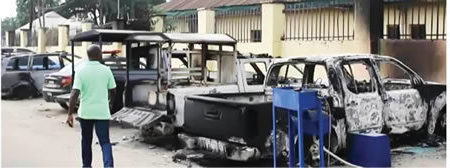An attack this week on a police headquarters and prison in southeastern Nigeria is the latest example of the country’s fast-deteriorating security situation, which is raising deeper questions about the unity of this fractious regional superpower, political and security analysts warn.
“The state no longer has the monopoly of force, it’s lost control,” Idayat Hassan, director of the Abuja-based Centre for Democracy and Development, told The New Humanitarian. “From the north to the south, life has become nasty, brutish, and short.”
Gunmen stormed the Imo State police command in Owerri on Monday, using explosives to get in. They then looted the armoury, torched the building, and headed to the nearby Owerri Correctional Centre, where they freed over 1,800 prisoners.
Police officials said the attackers were members of the Eastern Security Network (ESN), the armed wing of the secessionist movement the Indigenous People of Biafra (IPOB). That group is demanding independence for the region, although it has denied its involvement.
The Igbo-speaking southeast is Nigeria’s new zone of instability. It adds to a long list of other security troubles, including jihadist violence in the northeast that has left 11 million people in need of aid; unchecked banditry in the northwest; piracy and organised crime in the Niger Delta; and pastoralist-farmer clashes in much of the rest of the country that have displaced hundreds of thousands of people.
‘Biafraexit’
A weak state is both a consequence and enabler of the growing chaos.
Armed gangs, operating out of poorly administered rural areas – or the neglected shanty towns of cities – are part of a deeply entrenched criminal industry. The substantial profits earned allows the purchase of more and better weapons, and the intimidation or the pay-off of yet more local officials and members of the security forces.
“The sheer amount of ungoverned spaces that exist in Nigeria is the problem,” said Cheta Nwanze, an analyst at the Lagos-based risk advisory firm SBM Intelligence. With an unemployment rate of over 30 percent and anemic economic growth, “[you know] it can’t get better. These are the things driving insecurity.”
Separatist unrest in the southeast has particular resonance in Nigeria. The self-declared state of Biafra was a mainly Igbo secessionist enclave that existed from 1967 until its defeat by federal forces in 1970, in a war that may have claimed as many as one million lives.
The resurgence of the idea of self-determination stems from a perception of the region’s deliberate marginalisation by the government of President Muhammadu Buhari, and the heavy-handed policing by security forces that has killed hundreds of people since he was elected in 2015, according to Amnesty International.
That local grievance has helped drive the rise of IPOB, whose goal is to create a “new Biafra”, via a referendum. Despite IPOB’s non-violent calls for a “Biafraexit”, it was banned as a terrorist organisation in 2017.
The ESN, formed in December last year, has taken a far more radical position. It fought with security forces in the town of Orlu in late January, after which IPOB declared that the “second Nigeria/Biafra war” had begun.
Herders versus farmers
ESN has latched onto a single issue to justify its emergence – driving out Fulani pastoralists from the southeast, whose presence it characterises as an “invasion” by northern “killer herdsmen” following repeated clashes with local farming communities.
Fulani pastoralists traditionally migrate south with their cattle each year during the north’s dry season. But they now travel farther south and stay longer. It’s the result of unpredictable rains, a surge in cattle rustling, and banditry in the northwest, plus conflicts with local cultivators there, as expanding farms encroach on traditional cattle routes.
But in much of the south, the presence of armed pastoralists is viewed as the vanguard of a “Fulanisation” plot aimed at grabbing land, Islamizing a largely Christian region, and politically and culturally altering its demographics.
Poor policing aggravates Nigeria’s instability. It’s an issue of absolute numbers – the police/civilian ratio is well below UN recommendations – but additionally the lack of equipment, poor training, and low morale of the average officer.
As insecurity has worsened, the federal government has called on the army for help. But the military is also undermanned – stretched by the conflict in the northeast – and its members are not trained for a policing role. That means they are all too frequently shooting to kill, and with almost complete impunity.
“The military is now deployed in 35 out of Nigeria’s 36 states” but the security situation “is still terrible and deteriorating”, said Nwanze. A corrupt judicial establishment and clogged courts adds to the distrust many have for orthodox law and order systems.
Rise of the vigilante
As a result, some state governments have turned to community-based vigilante groups, a more traditional method of policing that draws on local knowledge and networks and that is in theory more accountable and effective.
Last year, the governors of six Yoruba-speaking southwestern states formed the crime-fighting Amotekun militia to tackle unprecedented levels of kidnapping, armed robbery, and clashes over grazing rights between farmers and pastoralists.
In the northeast, the Civilian Joint Task Force battles Boko Haram, while across the northwest there are a number of self-defence militia supported by state governments who are trying – and largely failing – to stem banditry.
“There would be no need for self-help if people believed the military and the police were doing the right thing,” said Isotonu Achor, a political risk consultant based in the southern oil hub of Port Harcourt.
But when the community takes the law into its own hands, it’s no guarantee of justice. In the southwestern state of Oyo, political firebrand Sunday “Igboho” Adeyemo incited attacks at the beginning of the year against the Fulani community he blamed for the death of a local politician.
In the northwest, when village-based Yan Sai Kai vigilante were formed to combat bandits, they tended to target Fulani – whether involved in criminality or not. That set off a chain reaction of tit-for-tat violence that has forced more than 280,000 people from their homes and disrupted farming – raising concerns for this season’s harvest.
“Everyone wants an Amotekun, but historically they have not worked,” said Hassan – referring to vigilante groups that formed in the early 2000s but degenerated into criminal enterprises themselves.
“There is a lack of training, and there is always extra-judicial killing,” she said. “Those [vigilante], initially welcomed as saviors, will eventually be condemned for their high-handedness and lack of accountability.”
Wanting to be heard
Insecurity tends to have deeper political roots. Groups like IPOB and Amotekun represent what Hassan sees as an urgent demand by communities to be heard by the government.
“The feeling of marginalisation is the key to all of this,” she added. “The state is absent, there is no response to this crisis, so everyone is taking up arms to defend themselves – or to enrich themselves.”
Nigeria’s union comes under periodic strain, but the current federal government, led by an ageing and often unwell Buhari, is seen as particularly ineffective. That is increasingly undermining the rationale for 200 million Nigerians to stick together.
A meeting of pan-Yoruba leaders in the southwest city of Ibadan last month concluded that “in Buhari’s Nigeria, the ship of state has veered dangerously off course, and heads almost irreversibly towards jagged rocks of destruction”.
Describing the security situation as worse than the civil war period, the communique called for a renegotiation of the terms of the country’s union. “Nigeria can only remain Nigeria if all parties agree to deal equitably with each other,” it added.
In the southeast that call is louder still among Igbo people. But support for IPOB is far from a given, and there is also the realisation that continued agitation will likely be met by ever-bloodier crackdowns by the security forces.
“I’ve spoken to people in the region who are terrified of what the [drive to secessionism] means, [some towns] have started trying to dissuade their boys from joining [ESN/IPOB],” Nwanze told TNH.
But his fear is that the security forces, who “behave like an occupying army, can be counted on to make things worse”.
YOU SHOULD NOT MISS THESE HEADLINES FROM NIGERIAN TRIBUNE
We Have Not Had Water Supply In Months ― Abeokuta Residents
In spite of the huge investment in the water sector by the government and international organisations, water scarcity has grown to become a perennial nightmare for residents of Abeokuta, the Ogun State capital. This report x-rays the lives and experiences of residents in getting clean, potable and affordable water amidst the surge of COVID-19 cases in the state…
Selfies, video calls and Chinese documentaries: The things you’ll meet onboard Lagos-Ibadan train
The Lagos-Ibadan railway was inaugurated recently for a full paid operation by the Nigerian Railway Corporation after about a year of free test-run. Our reporter joined the train to and fro Lagos from Ibadan and tells his experience in this report… police foil bank robbery ; police foil bank robbery ; police foil bank robbery ; police foil bank robbery.






